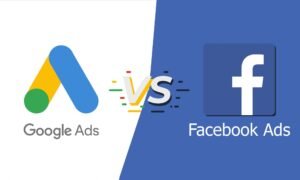
Google Ads vs. Facebook Ads: Choosing the Ideal Advertising Platform for Your Business
In today’s digital age, online advertising has become an essential component of any successful marketing strategy. With numerous advertising platforms available, businesses often face a significant decision: Google Ads or Facebook Ads? Determining which platform is better for your business can be a pivotal choice. In this article, we’ll explore the main differences between Google Ads and Facebook Ads, helping you make an informed decision on the ideal advertising platform for your specific needs.
Which is Better for Your Business: Google Ads or Facebook Ads?
The answer to this question isn’t one-size-fits-all. The choice between Google Ads and Facebook Ads depends on various factors, including your business goals, target audience, and the nature of your products or services. To make an informed decision, let’s examine the strengths and weaknesses of each platform.
Google Ads: Targeting Intent
Google Ads, formerly known as Google AdWords, is a pay-per-click (PPC) advertising platform offered by the world’s leading search engine. It’s the go-to choice for businesses looking to capture potential customers who are actively searching for products or services. Here are some key advantages of Google Ads:
1. High Intent Audience:
One of the primary strengths of Google Ads is its ability to reach users with high purchase intent. When someone types a specific query into Google, they are actively looking for information or a solution. Google Ads enables you to place your ads in front of these highly engaged users.
2. Keyword Targeting:
With Google Ads, you can target specific keywords that are relevant to your business. This allows for precise ad placement and ensures that your ads appear when potential customers search for those keywords.
3. Effective for E-commerce:
If your business revolves around e-commerce, Google Ads can be a game-changer. You can display product listings and drive traffic directly to your online store.
4. Measurable Results:
Google Ads provides comprehensive analytics, allowing you to track the performance of your campaigns in real-time. This data-driven approach helps you optimise your ad spend and maximize your ROI.
Facebook Ads: Targeting Demographics and Interests
On the other hand, Facebook Ads, now part of the Meta family, excels in connecting businesses with a broad and diverse audience. Here are some reasons why you might consider Facebook Ads:
1. Broad Audience Reach:
Facebook’s massive user base gives you access to a wide range of potential customers. You can target users based on demographics, interests, behaviours and even life events.
2. Visual Advertising:
If your products or services rely heavily on visual appeal, Facebook’s visual ad formats, such as image and video ads, can be highly effective in conveying your message.
3. Remarketing Opportunities:
Facebook Ads allows for sophisticated retargeting options, making it easier to re-engage users who have previously interacted with your brand.
4. Cost-Effective:
Compared to Google Ads, Facebook Ads can be more cost-effective, making it an attractive option for businesses with limited budgets.
Main Differences between Google Ads and Facebook Ads
To choose the ideal advertising platform for your business, it’s crucial to understand the key differences between Google Ads and Facebook Ads:
1. User Objective: Google Ads targets users actively searching for products or services, while Facebook Ads focuses on reaching users based on their interests and behaviours.
2. Ad Formats: Google Ads primarily uses text-based ads, while Facebook Ads offers a variety of visual ad formats.
3. Audience Targeting: Google Ads relies on keyword targeting, while Facebook Ads allows for demographic, interest, and behaviour-based targeting.
4. Ad Placement: Google Ads appear on Google’s search results pages and on partner websites, while Facebook Ads display on the Facebook platform and partner apps.
5. Budget and Cost: The cost structure can differ significantly between the two platforms. Google Ads often involves higher costs per click (CPC) due to competitive bidding, while Facebook Ads can offer more cost-effective options.
The Key Difference between Advertising on Google and Advertising on a Social Media Platform
The key difference lies in the user ‘s goal. When you advertise on Google, you’re meeting users with a clear intent to find a solution to their problem. On the other hand, advertising on social media platforms like Facebook is about introducing your brand to users who may not be actively looking for your product or service at that moment. This fundamental distinction should guide your decision.
In conclusion, the choice between Google Ads and Facebook Ads depends on your business objectives and target audience. Ideally, a combination of both platforms can be a winning strategy. Google Ads can capture high-intent users actively searching for what you offer, while Facebook Ads can help build brand awareness and reach a broader audience. By leveraging the strengths of each platform, you can maximize your online advertising efforts and achieve your marketing goals.
Don’t forget to visit LaborPerHour to find the right freelance services right away.
Remember that successful advertising campaigns require continuous optimization and monitoring. Regularly reviewing your ad performance and adjusting your strategies accordingly will ensure that you get the most out of your chosen platform. So, whether you decide to go with Google Ads, Facebook Ads, or a combination of both, the key is to stay adaptable and responsive to the ever-evolving digital landscape.





Leave Your Comment